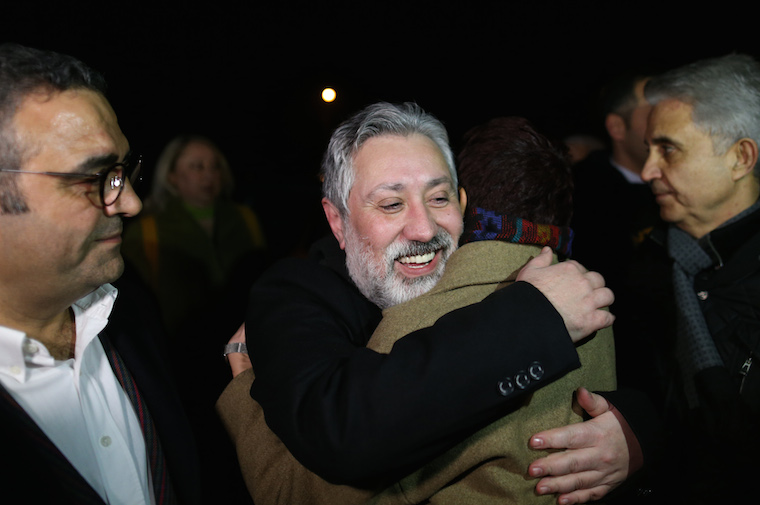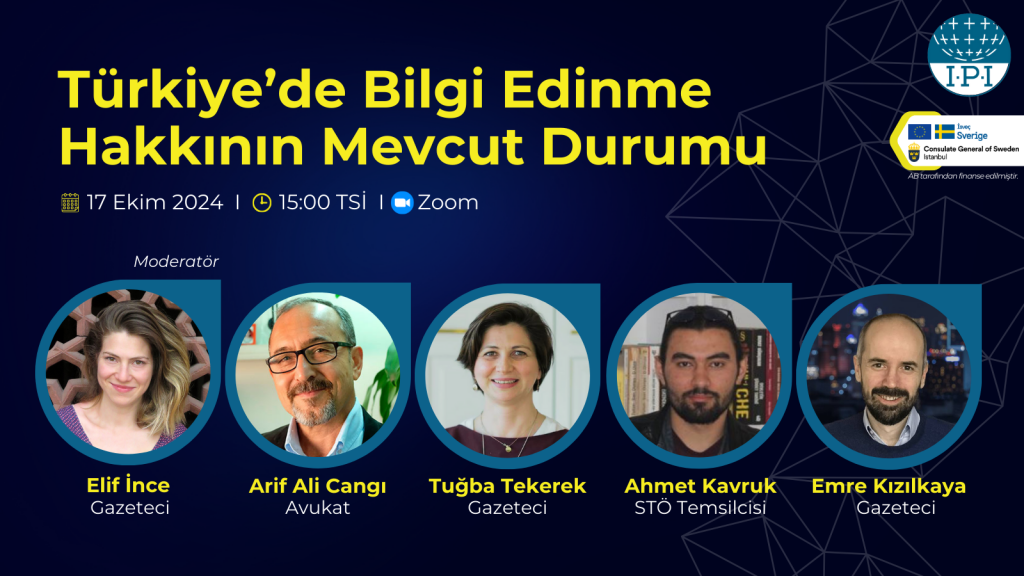The International Press Institute (IPI) welcomes the release on bail of two of its members in Turkey, Cumhuriyet Editor-in-Chief Murat Sabuncu and investigative journalist Ahmet Şık, but emphasizes the damage that their unjust pretrial detention and other failings of the judicial process have caused to press freedom in the country.
IPI Turkey Advocacy Coordinator Caroline Stockford attended the sixth hearing of the trial against Cumhuriyet, Turkey’s most prominent opposition daily, at Silivri detention facility on Friday, March 9. Sabuncu and Şık were freed following the hearing.
Despite satisfaction over the two releases, Stockford strongly criticized severe shortcomings in the rule of law.
“We are thrilled that IPI members Murat Sabuncu and Ahmet Şık, who never should have been behind bars in the first place, are free again”, Stockford said. “But we are disturbed by clear signs that Turkey’s judiciary is not able to guarantee journalists a fair trial.”
She pointed in particular to the words used by the lead judge in the case to deliver the verdict regarding the detention of four of the 18 defendants in the case, who have served an average of 16 months in pre-trial detention. At 22:10 local time, after two hours of deliberation, the judge made the following statement:
“Defendant Murat Sabuncu has wanted to see the Bosphorous, let him go and see it! Soner Yalçın said, ‘Ahmet Şık’s mother is a wise woman, don’t upset her,” so let’s not upset her. Aydoğdu (a defendant unrelated to the newspaper, implicated over a Twitter account) your case is different, you will continue in detention. The captain is always the last to abandon ship, Akın Atalay (Cumhuriyet CEO) stays here.”
The flippant nature of the judge’s remarks strengthen the case that the proceedings against Cumhuriyet amount to no more than a show trial. The release order came after Cumhuriyet reported the existence of a manual suggesting that trial judges should consult Turkey’s High Council of Judges and Prosecutors (HSK) before releasing suspects on bail in cases involving charges of membership in a terrorist organization or – as in the Cumhuriyet hearing – “aiding a terrorist organization while not being a member”.
“Recent events, including the judge’s remarks on Friday, raise serious questions about the impartiality of Turkish courts in these cases”, Stockford said. “We urge the Council of Europe to formally recognize that there exists no effective, impartial or speedy judicial recourse to applicants in Turkey and to review the Köksal case that is currently blocking Turkish applications to the European Court of Human Rights.”
Freedom of expression, the right to speedy, impartial and effective domestic legal recourse and personal freedom are human rights enshrined in the European Convention and must be protected by all signatory parties, including Turkey. The European Court of Human Rights and the Council of Europe have a responsibility to respond effectively to violations of such rights.
Despite their release, Şık, Sabuncu and other Cumhuriyet journalists including IPI Executive Board Member Kadri Gürsel continue to face prison time in the case. IPI will continue to monitor the trial against them and advocate for a full acquittal.
Full trial report
The hearing began in the largest courtroom at Silivri detention centre at 10:22 on the morning of Friday, March 9, 2018. Observers, numbering over 200 persons and including diplomatic representatives from Switzerland, the United States, Norway and Finland, were directed to sit at the back of the 100-metre-long room and had difficulty in hearing the lead judge.
The judge announced three new reports that formed part of the case file, one of which was included on Thursday and had not been submitted to the defence.
Defence lawyers began by appealing the three-lawyer limit permitted in the hearing, citing the high number of defendants and the varied nature of the charges against them. The appeal was rejected and the court went on to hear the first of three witnesses for the prosecution.
The trial prosecutor refrained, as is custom, from questioning the witnesses. In response to the first question by the lead judge, the first witness, Mehmet Faraç, proceeded to talk uninterrupted for 25 minutes without revealing any concrete evidence. His claims consisted of recounting his own history at Cumhuriyet newspaper and claiming that the editorial line had changed over the years and had become less secular and less republican. The witness claimed that on occasion the headlines of Cumhuriyet and the pro-Gülen newspaper Zaman had occasionally mirrored each other. No other, substantial evidence was presented. Faraç went on to claim that Bertil Emre Oder, the daughter of Cumhuriyet’s board member Hikmet Çetinkaya, had been shown preferential treatment in gaining a parliamentary seat with the People’s Republican Party (CHP) due only to her father’s influential position. Faraç was then cross-examined by one of the defence lawyers – who was also Oder’s husband – and the claim was refuted.
The judge stepped in twice to remind the witness to stick to the facts and to answer the defence in a concise manner. The defence questioned Faraç at length about the circumstances in which he was sacked from the paper but did not receive a concrete answer.
At 12.40 the second witness, former columnist and one-time bureau chief at Cumhuriyet Leyla Tavşanoğlu was called. Tavşanoğlu began by saying that she found it impossible to believe that any of her colleagues was involved in any way with terrorist groups. She was questioned by the judge about a trip made by a small group of Cumhuriyet staff to visit the exiled cleric Fetullah Gülen in Pennsylvania, whom Turkey’s government blames for the July 2016 coup attempt. She remarked that it was a normal visit by a press organization and otherwise unremarkable. On being asked whether she or any of her colleagues at the time had been asked to write in a certain style, manifesting certain political opinions, she replied that they had not.
The third and final prosecution witness was a member of the Cumhuriyet readers’ association. He spoke at length about his views on the paper’s editorial line and claimed that the paper was insufficiently supportive of the republic and of the values of secularism and that it did not oppose minority groups in Turkey sufficiently. He also cited drops in the newspaper’s circulation as evidence of its having been influenced away from its founding principles, saying, “It should not be called the Republic (Cumhuriyet) if it is not sufficiently republican.”
None of the prosecution witnesses gave any concrete evidence to support the allegations in the indictment against Cumhuriyet’s staff and journalists of having “aided a terrorist organization while not being a member”. Two of the witnesses were unable to answer simple questions about the makeup of the editorial and management board of the paper.
Defendants Akın Atalay and Aydın Engin were given permission to speak in response to the allegations regarding changes in editorial lines and inaccuracies in the witness statements.
The hearing broke for lunch at 14:00 local time and resumed to hear two defence witnesses: Altan Öymen and Kani Beko. Öymen, an IPI member, stated that he had known the staff and journalists at Cumhuriyet for a considerable amount of time and confirmed that the newspaper was committed to republican values and to democracy.
The second defence witness, Beko, chair of the Revolutionary Workers’ Union, also testified as to Cumhuriyet’s good reputation, calling it a “beacon of democracy”.
An attorney for the defence raised the point that if there existed any news article that had indeed breached the law while still being admissible under the time restrictions set by Turkish Press Law, authorities should identify that article and the paper would answer the accusation. The attorney underscored that word-of-mouth claims of association with a range of associations including the Gülen movement and armed terrorist organizations did not constitute substantive evidence.
The defence then demanded that judges wait until Istanbul’s 1st Civil Court had issued a ruling in a separate case involving the Cumhuriyet Foundation. The court declined, claiming that the outcome of that decision would not affect the guilt or innocence of the defendants in the present proceedings.
In justifying the decision, the chief judge tellingly said: “This is not a classic case of ‘membership of a terrorist organisation’.”
Reading from a statement, the prosecutor then called for the continued detention of all defendants in the Cumhuriyet case currently held in Silivri.
Next, the defence began to present its main arguments and asked that the testimony of one witness be struck from the record due to the fact that, despite claiming in his testimony to have authored books on violence against women, the witness in fact had been removed from his position in Cumhuriyet headquarters for pulling a female employee across the room by her hair. The lead judge made no comment in response to this.
The defence continued with eight further lawyers speaking on the irrelevant nature of much of the evidence against the paper, which consisted of details of sales of it assets, voting procedures at board meetings, and rising and falling circulation numbers. A defence attorney stated: “We feel that all this attention to the financial history and current financial status of Cumhuriyet has been detrimental to the paper and beneficial to their competitors.”
Three defence lawyers spoke specifically on the subject of the illegitimacy of the pretrial detention and the effect of a recent Constitutional Court ruling finding that the rights to free expression and personal freedom of journalists Mehmet Altan and Şahin Alpay had been breached through their extended pre-trial detention.
“I’d like to mention the deprivation of liberty suffered by our clients”, the defence attorney said. “Given the decision by the Constitutional Court on Altan and Alpay’s cases our clients’ rights have similarly been infringed.”
The judge interrupted defence attorneys several times, warning them to wrap up their arguments as it had been agreed that the case would finish by 18:00.
Notably, the lead judge refused to accept the defence’s arguments on legal precedents, including the Constitutional Court decision. The judge said: “You will not tell us how to make future decisions, we will not take such information from you.”
The defence then presented two further dossiers for consideration during the recess in which the judges would make their decision. The first dossier was flatly refused, with one of the judges saying, “I will not read it and I will not note the contents.” The second file was accepted at the bench.
At 19:15, the judges withdrew to make an interim decision on whether to continue to debate the verdict. At 20:05, notification was given that the judges would be in conference until 21:30.
At long last, at 22:20, the judges ordered the release of Şık and Sabuncu while extending the detention of Atalay.




